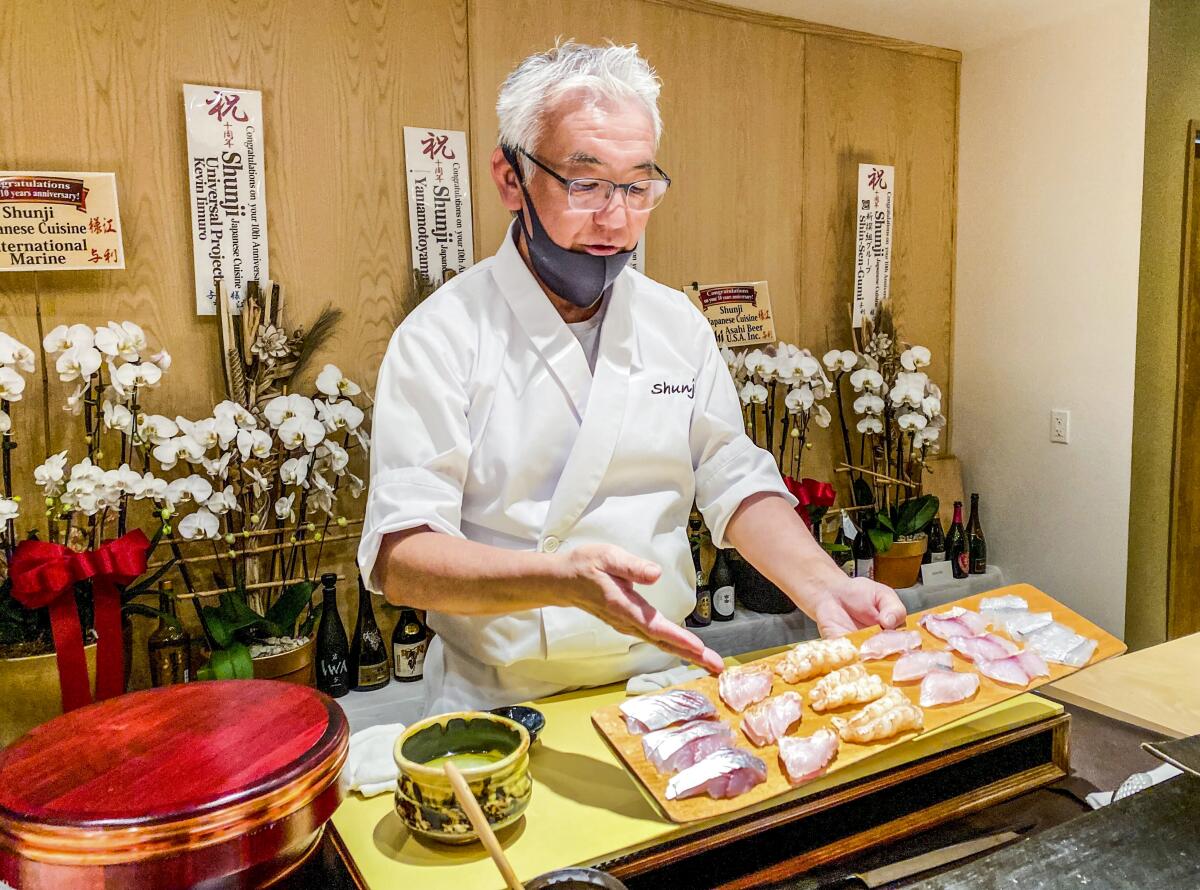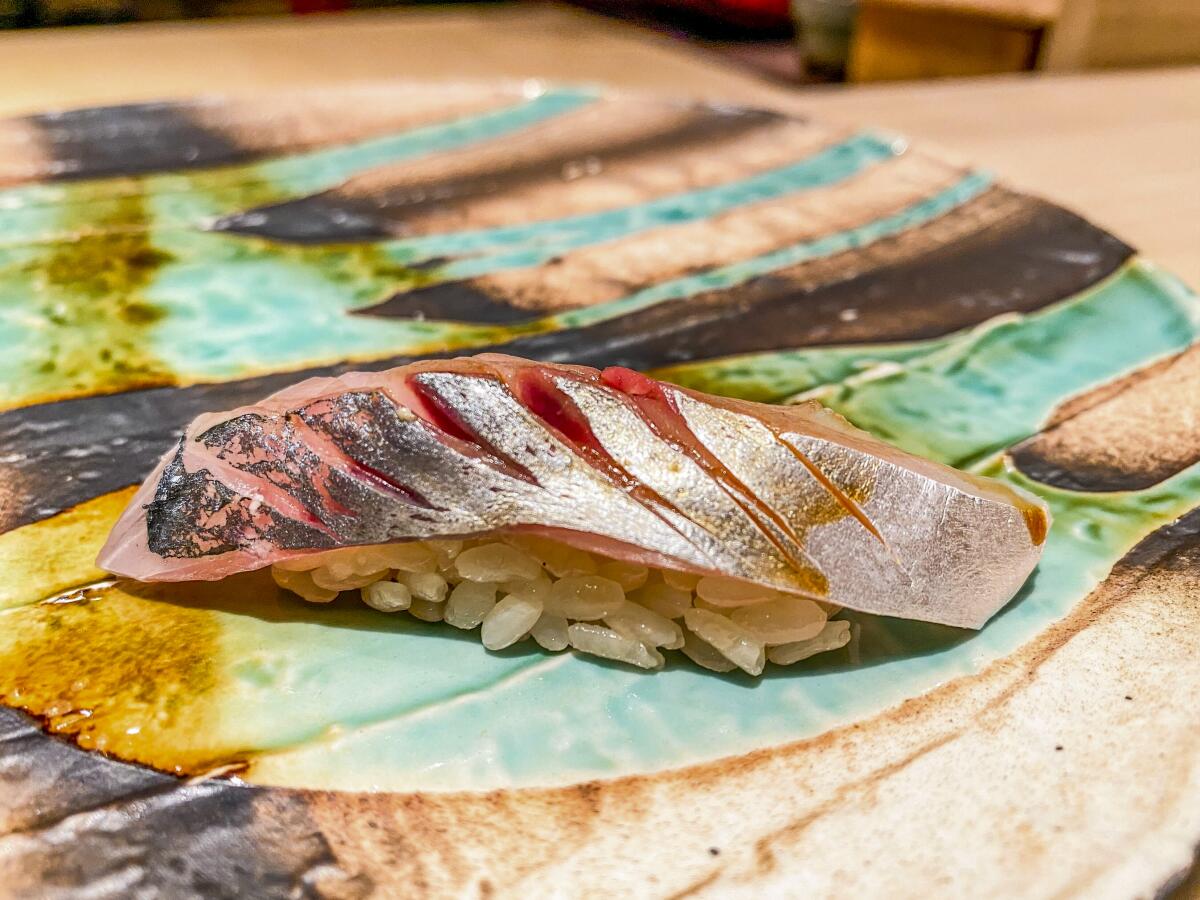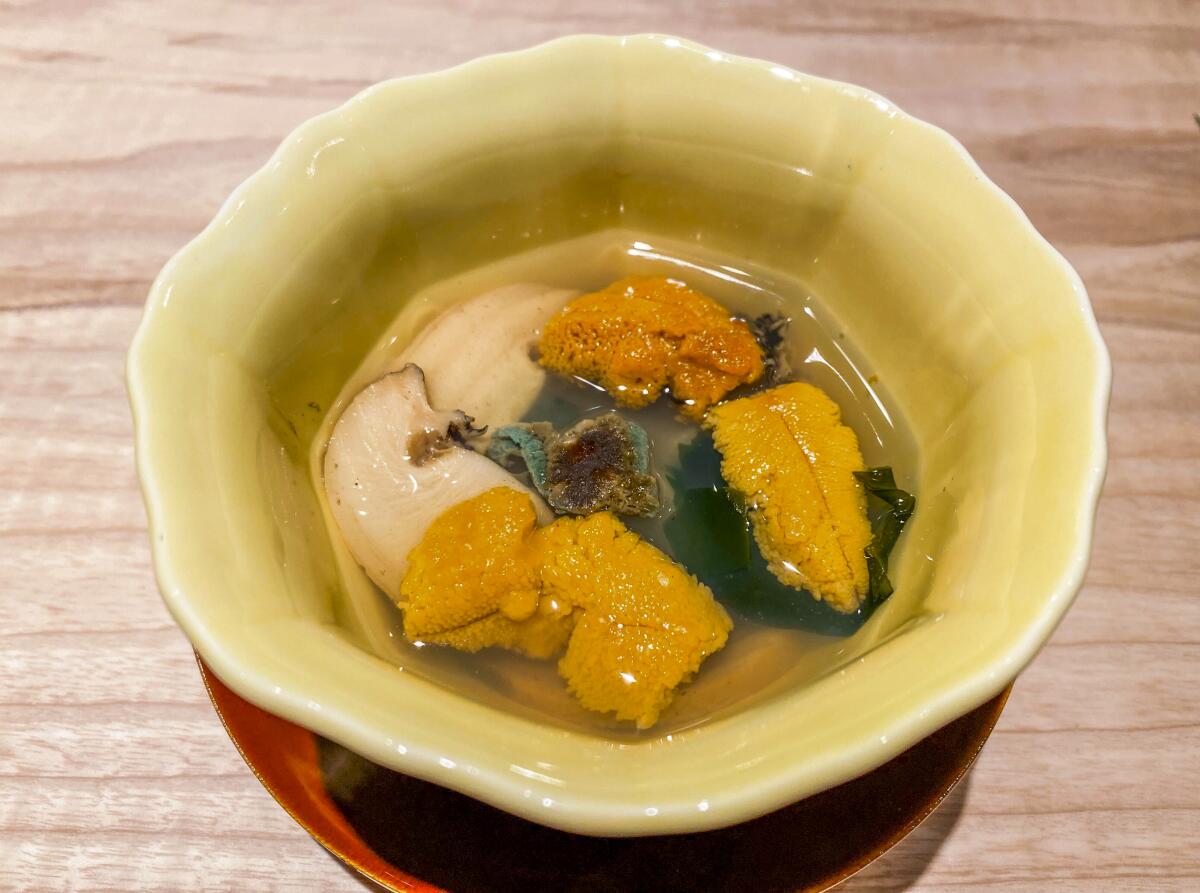New serious digs suit this L.A. sushi master

For eight years, from 2012 to 2020, Shunji occupied the wildest, most only-in-Los-Angeles location for a sushi bar possible: the Sawtelle restaurant operated out of a stuccoed 1930s-era building shaped like a soup bowl.
Mr. Cecil’s California Ribs was the previous tenant before Shunji Nakao took over the space, though over the decades it had also been home to a Mexican restaurant, a bar with the on-the-nose name of Roundhouse, a toy store and a real estate agency. It was originally constructed as one location of a short-lived restaurant chain called Chili Bowl; the programmatic architecture far outlasted the franchise.
Enjoying this newsletter? Consider subscribing to the Los Angeles Times
Your support helps us deliver the news that matters most. Become a subscriber.
The food Nakao prepared there had its own sense of place. He’s one of the quiet architects behind L.A.’s sushi culture. Along with his brother, Tetsuya, the native of Yokohama (a city 20 miles south of Tokyo) helped open Matsuhisa in the late 1980s. The brothers opened their own venture, Asanebo in Studio City, in the early 1990s. Nakao left Asanebo in 2000, working at other restaurants around the metro area and running his own place in Tokyo before returning to L.A. to bring his improbable circular theater to life.
Shunji’s menu was ambitious in every way: There were a la carte options as well as omakase in multiple price tiers, with elaborate vegetable whimsies woven in among the seafood courses. A signature was his agedashi tomato tofu, a stoplight-red block that would be finished with, say, a slice of grilled zucchini and a lone shishito balanced atop. Sometimes the vegetable bites could be a little fiddly, but the sushi and sashimi Nakao served were always among the most seasonal and deftly prepared in the city.
Then 2020 crash-landed: Nakao, like so many of his peers, turned to making elaborate chirashi and bentos for takeout to sustain his business. A complicated situation with the landlords, involving a bid to preserve the building amid plans for demolition, compelled Shunji to relocate.
Eat your way across L.A.
Get our weekly Tasting Notes newsletter for reviews, news and more.
You may occasionally receive promotional content from the Los Angeles Times.
The new address on Ocean Park Boulevard in Santa Monica — serene, minimal decor, blacked-out windows — is a deep reset. The bowl building included an eight-seat counter and seven tables. Shunji 2.0 has two rooms, each with white ash counters and space for seven seats: Nakao serves customers at one counter and chef Miki Takahiro mans the other. There is a single dining option: $250-per-person omakase, pushing Shunji high into the cost stratosphere but not quite reaching the pinnacles of Sushi Ginza Onodera in West Hollywood and Morihiro in Atwater Village, where prices top out at $400 per person. (Reservations are competitive at all these restaurants; each has a devoted audience.)
In a recent email exchange, Hayato chef-owner Brandon Go (a Southern California native whose father runs a sushi restaurant in Seal Beach) and I were volleying around ideas about the school of omakase that has come to define the dominant Los Angeles style. It involves half a dozen or more ornately small dishes — some cooked and some not, displaying mastery of an array of culinary techniques — that precede the centerpiece parade of sushi. Go calls it “sushi-kaiseki.” Some highly regarded Tokyo restaurants follow this format. At places like the famed Sukiyabashi Jiro, though, the emphasis is strictly on sushi, and a meal can be over in 30 minutes. “Sushi used to be like eating pizza,” Go wrote. “Nobody ever mentioned anything else on the menu.” He pinpoints Masa Takayama and his menu at Ginza Sushi-Ko (the L.A. predecessor to New York’s Masa) as potentially solidifying this style of omakase in Southern California.
I think about all this during my recent meal at the Santa Monica Shunji, where more solemn surroundings mean even more thoughtful food. I had nabbed a reservation to sit in front of Nakao. His bite-size geometric vegetable creations were gone, and I didn’t miss them. Not that flora disappeared: They were part of striking compositions like tiny fried ice fish over pureed spring cabbage, rendered nearly as smooth as applesauce while still recognizable in taste. The studies of texture were more profound, as with translucent, slippery baby eels in dashi topped with gently sticky grated mountain yam. A sprinkle of shiso flowers gave off faint echoes of mint and crunch. Amazing.

Other starter highlights: lobes of King mackerel smoked in green tea leaves; lotus root and shrimp “mochi” (in quotes because the dumpling resembles mochi in shape and chew though it isn’t made with glutinous rice) in clear dashi gravy topped with a single green bean and arugula flowers; and ichigone, a calming, vivid soup of steamed abalone and uni with turnip and wakame.
The sashimi procession kicked off with sayori, the thin silvery fish whose season (late winter to early spring) is coming to a close. Nakao crafts nigiri with rice that’s a little cooler in temperature than that of other sushi masters in town (namely Mori Onodera), and it has a slight pleasant bite to it still. His presence was friendly and relaxed but also intensely focused. He stood in front of rows of orchids sent by owners of other Japanese restaurants, with notes congratulating him on his move. At one point I asked him how it felt to be in the new space.
“The last place got too big,” he said. “I’m happy to be serving fewer customers again.”

He had the six of us in the room leaning in for the next morsel by then. We were busy taking pics of every piece at first but now we were present. Nodoguro (blackthroat seaperch) drew reactions for its soft richness. A meatball made of firefly squid, a favorite ingredient I remember from the old location, delivered liver-y intensity. A hand roll of ankimo felt like a finale. We all looked a little sad when a custardy block of tamago appeared to signal the end.
But there was an encore: clam miso, and then pear with sake gelée and lime ice cream.
By then the group was chatting about other favorite sushi restaurants around Los Angeles, and how happy we were to be sitting in front of Nakao again. Then we filed into the night, and the idea of eating food as remarkable as this in a building shaped like a chili bowl felt like something out of a trippy film, not impossible exactly but from a different reality that already seemed long gone.
Shunji: 3003 Ocean Park Blvd., Santa Monica, exploretock.com/shunji
Have a question?
Huntington Beach Pier dinner
The Los Angeles Times Food Bowl, presented by City National Bank, is partnering with Outstanding in the Field to serve a meal featuring sustainably caught seafood. The event will take place at 4 p.m. May 12 on the Huntington Beach Pier. Participating chefs include Brian Bornemann of Crudo e Nudo, Andrew Gruel of Slapfish, Chris Tompkins of Broad Street Oyster Co. and Valerie Gordon of Valerie Confections. The event benefits the Los Angeles Food Bank. Tickets are $365 and can be purchased here.
L.A. and N.Y. chefs pair for ‘Coast to Coast’ tasting event
The Los Angeles Times “Coast to Coast” tasting event, presented by City National Bank, will bring chefs from both coasts together for one night in New York to serve up some of their favorite dishes. The event, hosted by the Los Angeles Times Food Team, will take place on May 18, from 7 to 10 p.m., at the Altman Building, 135 W. 18th St., New York.
Participating Los Angeles restaurants include Birdie G’s and Rustic Canyon (chef Jeremy Fox), Phenakite (chef Minh Phan), El Ruso and Moo’s Craft Barbecue. In addition, actor, director, comedian, winemaker and cookbook author Eric Wareheim will be serving food from his “Foodheim” cookbook, and Las Jaras Wines, from Wareheim and winemaker Joel Burt, will be poured.
Participating New York restaurants include Cervo’s (chef Aaron Crowder), Dame (chef Ed Szymanski), Kimika (chef Christine Lau), Lure Fishbar (chef Preston Clark), Lysee (pastry chef Eunji Lee), Mena (chef Victoria Blamey), Nami Nori (chefs Taka Sakaeda and Jihan Lee) and Semma (chef Vijay Kumar).
Tickets are $150 and can be purchased here.
Eat your way across L.A.
Get our weekly Tasting Notes newsletter for reviews, news and more.
You may occasionally receive promotional content from the Los Angeles Times.



